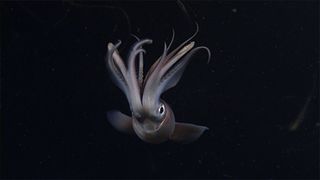Future of Jumbo Squid Questioned

The effects of climate change on the ocean could squeeze the jumbo squid out of its habitat, a new study suggests. As carbon dioxide from power plants, automobiles and other sources has built up in Earth's atmosphere since the dawn of the Industrial Revolution, nearly half of it has been absorbed by the ocean, gradually turning the waters more acidic. At the same time, the ocean is heating up, bringing the boundary of the "oxygen minimum layer" up closer to the surface — that's the depth below which the amount of oxygen in the water is too low for some sea creatures to survive. Scientists have known that an acidifying ocean poses a threat to corals and other organisms that have calcium carbonate skeletons; it will be harder to form these skeletons in a more acidic environment. But the effects of lower (or more acidic) pH levels on other marine organisms aren't well understood. Rui Rosa of the Universidade de Lisboa in Portugal and Brad Seibel of the University of Rhode Island looked at the effects of ocean acidification on the Humboldt squid, Dosidicus gigas (aka jumbo squid), which dwells in the Eastern Tropical Pacific from Tierra del Fuego to California. The situation is not good. In this part of the ocean, temperatures are already high and oxygen levels low and climate changes in the region are expected to be pronounced. The results of their study are detailed in the Dec. 15 issue of the journal Proceedings of the National Academy of Science. Squid squeeze Jumbo squid (not the same as giant squid) are very active and require a lot of oxygen to keep them going. Their blood-oxygen delivery system is highly sensitive to pH, so "the organisms are thought to live chronically 'on the edge of oxygen limitation,'" the authors wrote. During the day, the squid descend to lower depths in the ocean to rest, slowing down their metabolism to deal with the lower oxygen levels there. At night, they return to well-oxygenated waters nearer the surface to feed. But rising carbon dioxide levels in surface waters and growing low-oxygen zones could squeeze the space in the ocean where the squid can comfortably live. To see how the changes wrought by global warming might further exacerbate the squid's precarious position, the researchers conducted experiments with squids onboard a research vessel, subjecting them to carbon dioxide levels corresponding to the most pessimistic predictions for the year 2100. The researchers varied the oxygen levels and temperature of the water to match the nighttime and daytime habitats of the squid. They found that the changes to the squids’ environment made them more lethargic and therefore more susceptible to predators and less able to capture prey. This could force the squid to migrate, impacting local fisheries as the squid prey on new species, the authors said. Jumbo squids' diet consists of small fish and krill (shrimp-like marine crustaceans). The research was supported by the National Science Foundation, the Portuguese Fundação para a Ciência e Technologia and Fundação Calouste Gulbenkian.
- Video: Squid Swimming
- Top 10 Surprising Results of Global Warming
- Images: Under the Sea
Sign up for the Live Science daily newsletter now
Get the world’s most fascinating discoveries delivered straight to your inbox.

Andrea Thompson is an associate editor at Scientific American, where she covers sustainability, energy and the environment. Prior to that, she was a senior writer covering climate science at Climate Central and a reporter and editor at Live Science, where she primarily covered Earth science and the environment. She holds a graduate degree in science health and environmental reporting from New York University, as well as a bachelor of science and and masters of science in atmospheric chemistry from the Georgia Institute of Technology.
